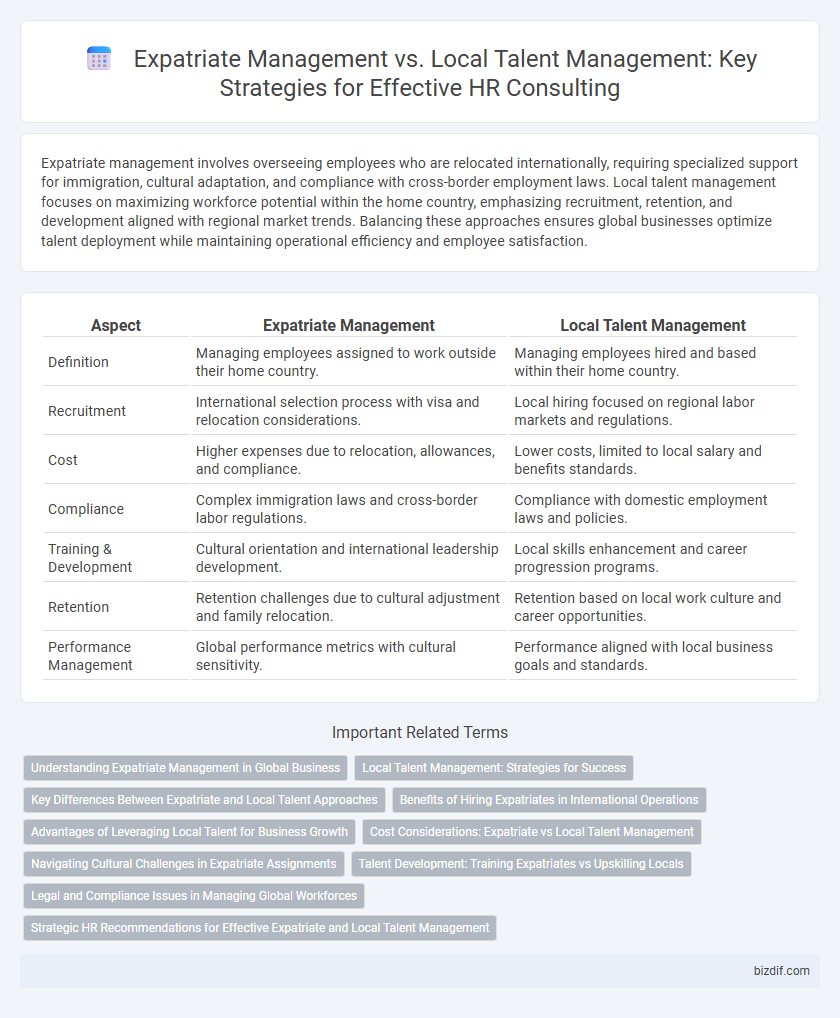Expatriate management involves overseeing employees who are relocated internationally, requiring specialized support for immigration, cultural adaptation, and compliance with cross-border employment laws. Local talent management focuses on maximizing workforce potential within the home country, emphasizing recruitment, retention, and development aligned with regional market trends. Balancing these approaches ensures global businesses optimize talent deployment while maintaining operational efficiency and employee satisfaction.
Table of Comparison
| Aspect | Expatriate Management | Local Talent Management |
|---|---|---|
| Definition | Managing employees assigned to work outside their home country. | Managing employees hired and based within their home country. |
| Recruitment | International selection process with visa and relocation considerations. | Local hiring focused on regional labor markets and regulations. |
| Cost | Higher expenses due to relocation, allowances, and compliance. | Lower costs, limited to local salary and benefits standards. |
| Compliance | Complex immigration laws and cross-border labor regulations. | Compliance with domestic employment laws and policies. |
| Training & Development | Cultural orientation and international leadership development. | Local skills enhancement and career progression programs. |
| Retention | Retention challenges due to cultural adjustment and family relocation. | Retention based on local work culture and career opportunities. |
| Performance Management | Global performance metrics with cultural sensitivity. | Performance aligned with local business goals and standards. |
Understanding Expatriate Management in Global Business
Expatriate management in global business involves strategic planning and support for employees assigned to work outside their home country, ensuring compliance with international labor laws and cultural adaptation. Effective expatriate management optimizes talent mobility, reduces relocation risks, and enhances global collaboration while addressing challenges such as tax equalization, expatriate compensation, and repatriation. This approach contrasts with local talent management by emphasizing cross-border assignment success and aligning global workforce strategies with organizational goals.
Local Talent Management: Strategies for Success
Local talent management focuses on leveraging in-depth knowledge of regional labor markets, cultural nuances, and regulatory frameworks to optimize workforce performance. Implementing tailored recruitment strategies, continuous skill development programs, and employee engagement initiatives ensures alignment with organizational goals and enhances retention rates. Data-driven performance metrics and localized leadership development are critical components for sustaining competitive advantage in diverse markets.
Key Differences Between Expatriate and Local Talent Approaches
Expatriate management involves strategic relocation, cross-cultural training, and compliance with international labor laws to optimize global workforce integration, whereas local talent management emphasizes community engagement, adherence to regional employment regulations, and development aligned with local market conditions. Expatriates require tailored support in relocation logistics, expatriate compensation packages, and cultural assimilation programs, while local talent management typically focuses on career development paths, succession planning, and talent retention within the regional context. The effectiveness of expatriate versus local talent management is largely influenced by organizational goals related to global expansion, cost management, and operational flexibility.
Benefits of Hiring Expatriates in International Operations
Hiring expatriates in international operations offers companies valuable cross-cultural expertise and a deeper understanding of global business practices, which enhances strategic alignment and operational efficiency. Expatriates facilitate knowledge transfer and leadership development, driving innovation and maintaining corporate culture consistency across borders. Their presence ensures compliance with local regulations while bridging communication gaps between headquarters and foreign subsidiaries, maximizing overall organizational performance.
Advantages of Leveraging Local Talent for Business Growth
Leveraging local talent enhances business growth by providing deeper market insights and cultural alignment, which improves customer engagement and operational efficiency. Local employees typically offer cost advantages through lower relocation and expatriate management expenses while fostering stronger community relations. This approach supports sustainable expansion by building a loyal workforce attuned to regional business dynamics and regulatory environments.
Cost Considerations: Expatriate vs Local Talent Management
Expatriate management incurs higher costs due to relocation expenses, international benefits, and tax equalization, often exceeding 2-3 times the salary of local talent. Local talent management reduces financial burdens by eliminating cross-border allowances and compliance with complex expatriate regulations. Companies optimize budgets by balancing these costs against strategic objectives and talent availability in target markets.
Navigating Cultural Challenges in Expatriate Assignments
Expatriate management requires specialized strategies to navigate cultural challenges by providing cross-cultural training and ongoing support to ensure successful adaptation in foreign environments. Local talent management focuses on leveraging indigenous knowledge and cultural nuances to enhance employee engagement and organizational integration. Effective HR consulting balances these approaches to optimize workforce performance and foster global business success.
Talent Development: Training Expatriates vs Upskilling Locals
Talent development in expatriate management prioritizes specialized cross-cultural training and global leadership skills to ensure expatriates adapt effectively to international assignments. In contrast, local talent management focuses on upskilling local employees through targeted professional development programs that enhance region-specific skills and foster long-term employee retention. Both strategies optimize workforce capabilities but differ in approach based on mobility and cultural integration needs.
Legal and Compliance Issues in Managing Global Workforces
Expatriate management requires strict adherence to international labor laws, visa regulations, and tax compliance, which vary significantly across countries. Local talent management focuses on navigating domestic employment laws, social security obligations, and cultural compliance specific to the host country. HR consulting must ensure comprehensive legal frameworks are integrated to mitigate risks and maintain global workforce compliance.
Strategic HR Recommendations for Effective Expatriate and Local Talent Management
Strategic HR recommendations for effective expatriate and local talent management emphasize aligning global mobility policies with business objectives to optimize workforce performance and cultural integration. Implementing tailored development programs and comprehensive support systems enhances expatriate productivity while strengthening local talent retention through competitive compensation and career advancement opportunities. Leveraging data-driven insights and continuous feedback loops ensures adaptive talent strategies that address evolving market dynamics and organizational needs.
Expatriate Management vs Local Talent Management Infographic

 bizdif.com
bizdif.com